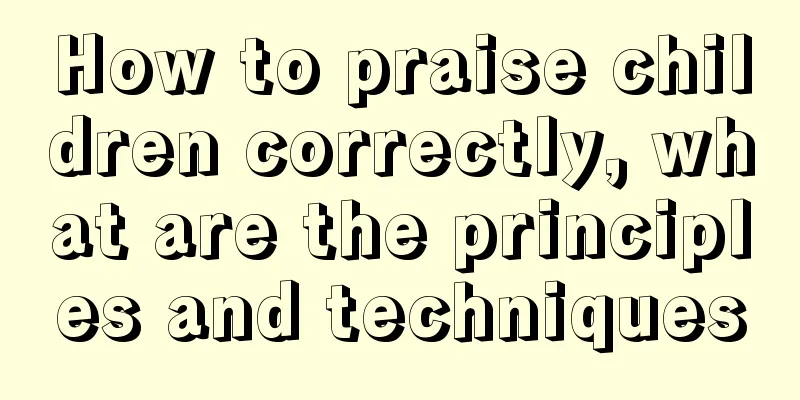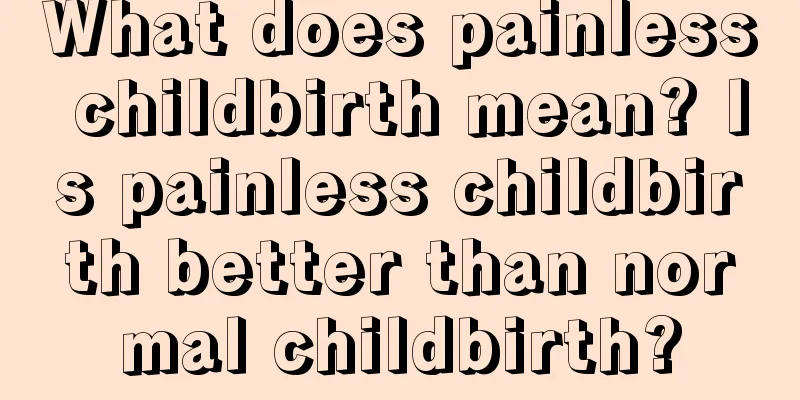How to praise children correctly, what are the principles and techniques

|
Praise is like a stimulant for children, which can boost their self-confidence and even build a good mentality for the future. But what many parents don’t know is that praise also requires skills and the right way. If you praise blindly, it may have a counter-effect on the child’s personality. The Wrong Way to Praise Your ChildAlways praise easily: Parents often say to their children - you are great, because every detail of the child's growth is worthy of praise, so whether the baby can smile, roll over and crawl, or talk and walk, etc., it makes parents feel surprised in their hearts, so they always speak with a tone of praise.The disadvantages of casual praise: Parents always give casual praise, and in principle they don’t think about the possible negative effects. But maybe one day, parents will find that their children seem to be easily afraid and panic about setbacks or failures, and seem to have poor stress resistance.Unclear praise: If parents always praise their children in a general way, it is easy for the children to feel at a loss. When praising children, it is necessary to be more specific and specific. Only with specific and targeted praise can the children understand and know what direction or things they should work hard on in the future.Bad language habits: Many parents often praise their children for their intelligence, and it may even become a habitual expression. However, if every progress is defined in terms of intelligence, it will only make the child think that good grades are equal to intelligence, which may make the child more proud rather than confident.Praising character rather than facts: Some sentences are actually just typical compliments on personality, such as: good child, etc. Parents always unconsciously say these words, but in fact this is a rather abstract concept for children, and children are prone to feel ambiguous.Increase invisible pressure: In fact, being praised constantly will make you feel very happy at first, but pressure will appear over time. It is an invisible burden, and you may even slowly start to not want perfection.Excessive praise: If parents often exaggerate their praise, children will resist, thinking that they are unworthy of such praise, and will instead make trouble and do something strange.The right way to praise your childPay attention to the child's efforts: Parents should try to give specific encouragement. Of course, they must first be clear about what the child has done, and even be able to see with their own eyes the child's good intentions and seriousness. At this time, they can carefully describe the behavior they have seen, which will be more convincing.Don't give perfunctory praise: Occasionally parents will give casual or even perfunctory and absent-minded praise for their children's performance. Children will be very sensitive to this, so never give praise without intention, as this will hurt the children's heart.Encourage and praise in advance: Parents can also try to praise their children before they do something, as a preventive measure to show affirmation, which can also achieve unexpected results.The impact of correct praise on childrenIncrease children's self-confidence: Everyone needs to be affirmed. When children are praised, they will feel affirmed invisibly, so they will have self-confidence, and it will be easier for them to be confident when doing things and they will not be easily defeated.Influence on children's behavior: Children who are affirmed are more likely to behave positively and optimistically. On the contrary, children who are often denied are more likely to be pessimistic and negative.Improve parent-child relationships: Children who are often praised by their parents will agree more with what their parents say, and will care more about family and kinship. This can improve the relationship between parents and children and warm up their feelings.Affects learning motivation: Children who are often praised are more willing to take risks and try new things, so they will be more proactive in learning and usually have better grades. If a child is often scolded and denied, it will easily affect his mentality of learning new things. |
<<: How to reduce children's learning pressure and what are the behavioral reactions
>>: Can babies eat mashed potatoes? How to make mashed potatoes for babies
Recommend
Can pregnant women eat vermicelli? Precautions for pregnant women to eat vermicelli
Vermicelli is a staple food that we often eat in ...
What clothes should I wear during the confinement period in August? What shoes should I wear during the confinement period in August?
The confinement period is an extremely important ...
The correct way to use a breast pump Precautions for using a breast pump
Breast pumps are a good helper for working mother...
What should babies with anemia eat? What should babies with anemia eat?
Baby anemia is a problem for many families. Long-...
How long does a newborn baby feed on breast milk? Is it normal for a newborn baby to feed on breast milk for ten minutes at a time?
How long should a newborn baby feed on breast mil...
What should I do if my baby is anemic? What should I do if my baby stutters?
Anemia is very harmful to our body. Anemia in chi...
Can women with nephritis still get pregnant?
Wanting to have a cute baby is the wish of mother...
Can children eat pomegranate seeds? What are the benefits of eating pomegranates for children?
Pomegranates are available in the autumn of each ...
Can a newborn baby's belly button touch water? Can a newborn baby take a bath if his belly button hasn't fallen off?
Many mothers are at a loss as to how to care for ...
What is the normal body temperature for babies in summer? Will babies have a high body temperature in summer?
The weather is hot in summer. Many babies who hav...
What is the dirt on the newborn's head? How to wash it off?
The baby is only one week old, and there is a thi...
What is the cause of children's urine dripping and leakage? What should I do if my baby drips urine?
Urine dripping is a common symptom of urinary tra...
Will a boy be born earlier than the expected date? There are two reasons why boys are born earlier than girls.
Boys will be born before the due date, while girl...
Should you squeeze the nipple of a newborn baby?
The whole family is very happy when the baby is b...
Can eggs remove fetal toxins? How to remove fetal toxins with eggs
Fetal toxins are a kind of internal heat caused b...









